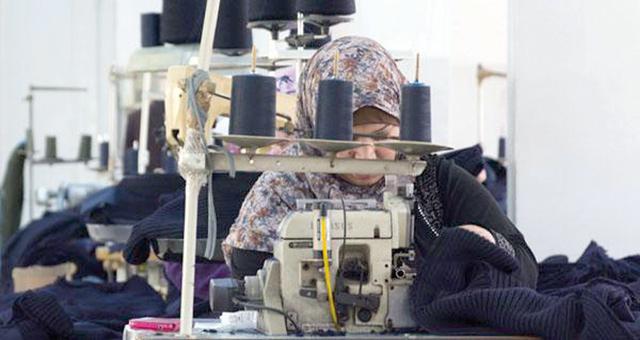- Local News
- Thu-2021-03-11 | 03:12 pm

Nayrouz News Agency :
The Jordan Strategy Forum (JSF) has issued a policy brief exploring the contributions of Jordan’s textile sector to the national economy and labour market, in addition to the challenges faced by the sector, and the potential opportunities to promote the sector by attracting new investors and allowing expanding current investments.
Since the 1990s, the textile sector has been one of the top five exporting sectors in Jordan’s most important exporting industries, and a home to over 32 international brands, the JSF said.
This was enabled by the establishment of the Qualified Industrial Zones (QIZs) and the Jordan-US Free Trade Agreement, according to the policy brief, of which a copy was made available to The Jordan Times.
In 2018, the textiles industry contributed to approximately 7.74 per cent of the total Gross Value Added (GVA) of the industrial Sector, according to a World Bank 2020 report.
In the same year the "manufacture of wearing apparel” industry had the fourth highest consumption in terms of intermediate services out of the 29 industries in Jordan, and the fifth highest intermediate consumption of goods used in production, the policy brief said.
It also noted that the raw materials needed for production are mostly imported, and this fact exacerbates Jordan’s trade deficit, and increases the costs of production due to shipping costs.
The strong performance of the sector made Jordan a global competitor in the textiles industry, which is a testimony to the sector’s efforts to comply with international standards in production, operations, and labour conditions, according to the JSF study.
Due to trade agreements, exports of the textiles sector have been concentrated in the North American market, the JSF said, calling for extra efforts to take advantage of the existing FTAs and increase Jordan’s share in the European and Arab countries’ markets.
However, the Jordanian textiles sector has been facing difficulties in penetrating the European market at a high level for several reasons, the core of which lies in the demand of customers.
They prefer to import brands from North Africa that has a competitive edge in transportation costs and cost of unit. Therefore, further enablers for the textiles sector may be necessary, if Jordan wishes to capitalise on its global comparative advantage in the sector by diversifying the trade share in multiple regions, the policy brief said.
Labour
While the ratio of Jordanians to non-Jordanians is compliant to the multiple Free Trade Agreements, the number of Jordanians working in textiles has been rather low. By the end of 2019, Jordanians working in the textiles sector constituted 1.4 per cent of the total employment of Jordanians, and 2.3 per cent of total Jordanians working in the private sector.
According to Jordan Garments, Accessories & Textiles Exporter’s Association (JGATE), the textiles industry has committed to increase the ratio of Jordanians to non-Jordanians by 30 per cent. In terms of gender, females constitute approximately 73 per cent of all workers.
The presence of a high number of non-Jordanians poses a large financial burden on the sector. In 2018, residence fees and work permits constituted about 45 per cent of the sectors total indirect taxes (JD14.3 million), according to the policy brief.
The minimum wage for Jordanians is set at JD220 for Jordanians, as per the collective bargaining agreement signed in November of 2019. Nevertheless, Jordanians are paid, on average, approximately JD270 and this amount excludes the additional JD50 for transportation, accommodation, as well as meals and other benefits, the JSF said. Given the number of Jordanians who work in the sector in 2019, it can be estimated that JD64.8 million is paid in wages and benefits per annum.
As far as the non-Jordanian employees are concerned, they are paid, on average, approximately JD250 per month. Just like Jordanians, non-Jordanians are granted compensation for over-time.
COVID impact
In 2020, COVID-19 has imposed unprecedented challenges to the Jordanian economy at large, as well as to the textiles sector. These challenges forced the industry to decrease the number of its overall employees, while others had no choice but to shut down their operations, or move production to other countries the JSF brief said.
The garment sector was the first sector to support the need of the government of personal protective equipment (i.e., masks and gowns). It was the only sector that maintained employment for all Jordanians, even when they stayed at home with full payment of salaries, according to the policy brief.
By the end of September 2020, the decrease in national exports from the textiles sector reached 13.2 per cent in comparison with the same period in 2019.
In view of these observations, the policy brief proposed a set of recommendations calling on stakeholders in the textiles sector, the government should construct a long-term strategy to ensure policy predictability that directly impacts investor confidence and investing appetite.
It called for increasing the share of Jordanian employees in the sector, and given the sector’s success in Jordanian female employment, the government should propose a legal framework, in collaboration with the sector’s stakeholders, to ensure lower rates of attrition of Jordanians, and increasing the focus on employing Jordanians for middle management positions, among other recommendations.
Within the context of the challenges that have arisen, due to the COVID-19 pandemic, the textiles sector should establish a new partnership with the government to increase the ease of doing business, and policy predictability, to promote inclusive and sustainable economic growth, according to the JSF.









